- Details
-
Published on Tuesday, 21 September 2021 23:09

Tir is, though quite recent, already a well-established name in the dungeon synth/dark folk spheres, presenting music influenced by Wongraven, Burzum, Empyrium, Nhor and early Mortiis and, yet profoundly individual. Behind the Tir musical project is Oytun Bektas from Turkey, who now resides in Australia. His debut album, Mountains, was released in December 2016, while in March this year, a new epic work of art, Persepolis (you can read the review HERE), saw the light of day. There is not much data on Tir out there - most to be searched in his music and some to be found in this interview. And yet some hold the lines accompanying the Persepolis album: "Mankind was once on another journey, one found rooted in the ancestors of the ancient past. Presenting us with war and nature on the one hand, and falsehood, fears and ambitions on the other, the empire of Persepolis greets us with its lurid face. While ashes rained from the sky, legions of swords unsheathed revealed the unchanged quest for human power often overshadowed by revenge, power and glory. And yet, as the great earth is reflected in the air; and the sky in the stars too, these stories of life and death are a symphony that transcends centuries, and it was an honour for me to describe this chaos."
Interview with: Oytun Bektas
Conducted and edited by: Jerneja
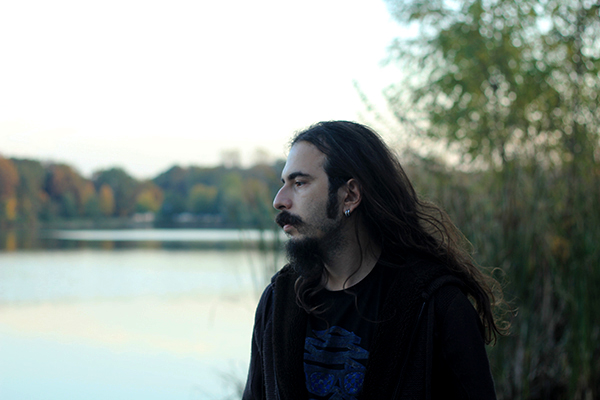 Jerneja: Thank you, Oytun, for accepting my interview request. Maybe the predictable first question, but anyway, what Tir stands for?
Jerneja: Thank you, Oytun, for accepting my interview request. Maybe the predictable first question, but anyway, what Tir stands for?
Oytun: Thank you for the interview offer. The word "tir" originated in Asia. I can say it's old Turkish. It means alone and uniqueness. It is sometimes confused with Tyr in Northern mythology, but it has a different meaning completely.
Jerneja: In December 2016, you released your first album, titled Mountains, then another five albums followed. The last one, Persepolis, was released this March. So, over an album per year. That is quite unusual. Where do you get all this inspiration?
Oytun: It was not really my intention to create an album statistic every year in this way. I think I've been waiting for a long time to produce music because I've progressed as a good music listener and commentator until my mid-thirties. But as you noted in 2016, this silence ended. Even now, I have a number of compositions up my sleeve with which to complete something new!
Jerneja: About your last album Persepolis... Persepolis was the ceremonial capital of the Achaemenid Empire (c. 550–330 BC), situated in the plains of Marvdasht, encircled by the southern Zagros mountains of Iran. Modern-day Shiraz is 60 kilometres southwest of the ruins of Persepolis. Is your Persepolis related to this, and/or what is its concept/message?
Oytun: Actually, I'm not very interested in official history. Official history is always full of nonsense that the rulers have glorified themselves with. Of course, the listener experiences a lot of the feelings of the historical period that you are talking about in this album, but I especially tried to portray the more unknown darkness and scary myths of the region through this album. All these myths and stories take place in a large and very ancient civilization in the middle of a vast red desert. The theme of the album centres on a topic that I also relate to in previous albums: the Cosmos. The dust of the stars also hits the Land of Persepolis.
Jerneja: Although the Persepolis album is an expanded, re-mixed and re-imagined version of another album of yours, The Vanished Civilization Of Xattoth, released by Heimat Der Katastrophe in 2019. How come the re-mix and so many changes?Oytun: The cassette I released with Heimat Der Katastrophe was a lot of fun. In fact, I'm working on a project with them again at the moment. The main body of the music, which became
Persepolis dates back to 2019. I always had the idea in mind to strengthen parts of
The Vanished Civilization Of Xattoth album later, in order to give them a stronger momentum. After I visited Iran, I began to feel that these melodies were more associated with this land. After that, the symphonic elements were developed, and a more aggressive theme began to appear in front of me. After that moment, it was impossible to stop!
Jerneja: Would you please tell us something about this civilization of Xattoth, who were these people and why they vanished? I must admit I've never heard of this civilization. Unless you made it all up...Oytun: Xattoth was a fictional work created by Heimat Der Katastrophe. So, the script belongs to them. It affected me deeply when I first read it. Incredible darkness, a serious sense of loneliness and a mysterious adventure.
Jerneja: For all of us who haven't read the book (yet) - what was the "main issue" of Xattoth's civilisation, and/or what exactly affected you to the point you had decided to compose music on this theme?Oytun: This was not really inspired by a book - the story of "The vanished civilization of Xattoth" came directly from the guys behind Heimat Der Katastrophe, the label that released the album. They sent me through a role-playing module which they made up themselves and I had to write music to go along with each of the encounters. The writers sum it up as follows: "What is the meaning of 'horror'? Maybe the sense of horror rises from the encounter with what is not human, with a reality that is 'beyond'. The protagonist of this adventure faces a fatal encounter with the unexplicable and, in the moment in which the horror seems to overwhelm him, he awakens from a magical sleep and has the feeling that everything he so vividly has lived has never happened..." I can say that it took me some time to be a part of that lonely man's process and to get this story up and running.
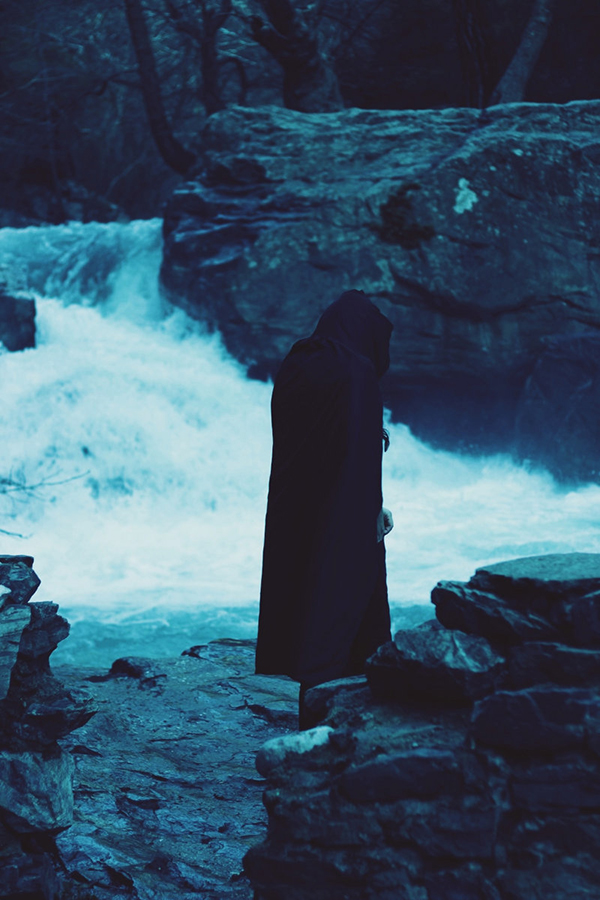 Jerneja: The Vanished Civilization Of Xattoth is not the only one Tir's album with a "second version". The first album, Mountains, also has one - the third album, Mountains Redux, released about three years later. How come? Since all of your albums were (quickly) sold out, it's hard to believe you wouldn't be satisfied with the "first version"?Oytun
Jerneja: The Vanished Civilization Of Xattoth is not the only one Tir's album with a "second version". The first album, Mountains, also has one - the third album, Mountains Redux, released about three years later. How come? Since all of your albums were (quickly) sold out, it's hard to believe you wouldn't be satisfied with the "first version"?Oytun: These weren't very planned situations. The extended (redux) version of the
Mountains album was realized at the suggestion of Repose Records, the label I was working with at that time. The next one was a process that proceeded with the strong recommendation of a fanzine I liked. Of course, the important thing here is that the two albums have surpassed themselves in content and dynamism. These were the steps that made very important contributions to
Tir's history.
Jerneja: When your debut album with Tir got released, you've already been over thirty years old... Does this mean you only got engaged with music that late, or you were active in some other bands or musical projects till then?Oytun: I never thought of making a quick introduction to music. I have been researching sounds and musical styles for many years. I was creating things at intervals, but I was either keeping them secret or deleting them directly. As I was just passing through my 30s, I felt the time had come, and I started this project. The most important point that spurred me on to start making my own music was the lack of lustre found in the dark music genre with popular attitudes and most bands not sticking to the roots so to speak. I am trying to protect the music I want to make from these behaviours as much as possible.
Jerneja: Speaking of projects... You released an EP Essence with Ruins Of Xibalba last September. Was it just a one-time project regarding its dedication to the Mayans, or are you planning to continue with it as well? Anyway, please, tell us something about the Essence EP.Oytun:
Ruins Of Xibalba is a completely independent project from
Tir. I can say that it is a dark electronic music understanding with more ambient elements. It is hard to tell exactly where it will evolve as it is still in the early maturation stage, but my sole target is the historical description of the ruins of Xibalba. In other words, I am in pursuit of creating completely historical concept albums. I'm thinking of releasing my first album before the end of this year. The
Essence demo got the positive feedback I wanted and expected. Now it is necessary to raise the bar, and I believe I will achieve that with the first album!
Jerneja: How do you compose your music? Only digitally, or you also play on some instruments - which one(s)?Oytun: The way this "wind" arrives often differs. Sometimes while riding a bike, sometimes watching the ocean or being in nature. But I usually take care to compose my compositions on the piano because this is a more basic way to develop the algorithm for the whole song. Also, recording and digitizing songs in this way is much more ideal. Of course, sometimes "real" instruments, those being my flute and guitar, contribute to my work.
Jerneja: What about your working process - how does your composing day look, regular procedures or random?Oytun: Everything happens suddenly. I do not undertake any serious planning, and I need to be in an environment that will not stress me out. Compositions come when they do, and I try not to prevent them from taking shape as they will. That is all.
Jerneja: If you were a musical instrument, which one would you be, and why?Oytun: It may be a bit of a mystical approach, but for me the main instrument is nature. I would like to be nature, plain and dark!
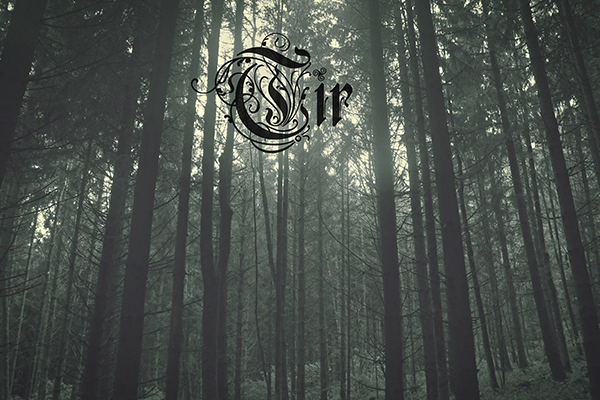 Jerneja: There are only rare tracks where we can hear your voice (if it is your voice), and artificial voices are not very representative in your music either (if they are artificial voices)...Oytun
Jerneja: There are only rare tracks where we can hear your voice (if it is your voice), and artificial voices are not very representative in your music either (if they are artificial voices)...Oytun: You're right. I prefer not to use my voice at the moment. But I don't have a firm stance on this. After all,
Tir is continuously evolving in itself. In other words, when it feels natural like other instruments and effects, maybe I will implement more whispering or reciting poetry and introduce the colour of my voice more to you. But to answer your question properly - yes, you are right, it is my voice you hear on the tracks "Tyr" and "Invisible Part Of Mountains".
Jerneja: Two of my favourite Tir's songs, "Song Of The Rain" and "Memories In The Shadow", features Thomas Helm's (Empyrium) vocals. Both are on Urd, Skuld & Verdandi album - mixed and mastered by Markus Stock (Empyrium) at Klangschmiede Studio E. How did it come to this cooperation with Empyrium?Oytun: My friendship with Markus goes back a long time. We organized concerts and spent a lot of time together. Since we live in different countries, most of this friendship was, of course, "digital". We are still living our friendship mainly digitally because of all of the Covid bullshit. Let's go back to your question. While touring the Rhön forests in 2017, he told me that he wanted to master the next album... Yes, Markus is an important friend to me, but he is also a respected musician and engineer! This offer made me very happy. The next process developed rapidly. Thomas' vocals and the studio recording/environment. Obviously, this cooperation did not end there. The cover art of the
Nigritude EP also belongs to Markus. And we will definitely have joint plans together in the near future!
Jerneja: The lyrics of both tracks are somehow significant, lovely deep. And their structures are those of poems. No wonder, since written by the poets Kahlil Gibran and Peter Kassel. Also, a few of your other songs have poem structure, which is not very common in music…Oytun: Thanks again for your interest and kind comments in regards to the poems and the songs. Both poets are important to me. But here, I need to open a separate parenthesis for Peter Kassel. When he first conveyed "Memories In The Shadow" to me, the language of the lyrics was German, and it had an incredibly mystical and deep narrative technique. Later, Helm and I decided to present it in English. Frankly, I am absolutely happy with this decision, but Peter's approval and friendship on this matter were very important to me.
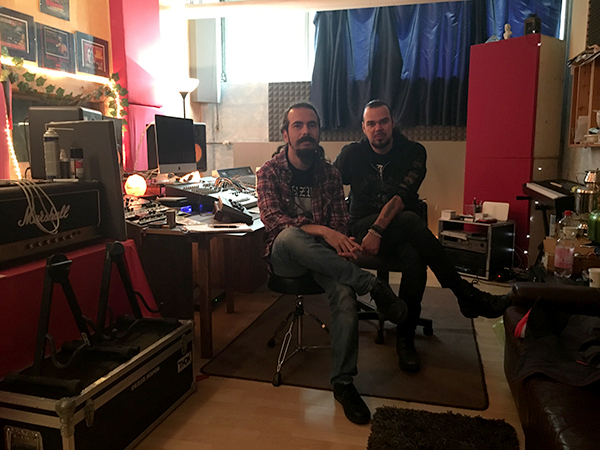 Jerneja: What does composing music mean to you, giving inspiration an "eternal life", healing yourself, or...?Oytun
Jerneja: What does composing music mean to you, giving inspiration an "eternal life", healing yourself, or...?Oytun: In fact, the subject of composing is not a case of planning for me or taking separate time for it. I mean, sometimes when I walk down the road, listen to the wind, or look at the night sky, melodies start to appear in my head. So, as soon as you start to feel that the music or art you make belongs to nature and the universe, you are already intertwined with these melodies! I assure you, I also "live it one-on-one" all of these things which you have mentioned above.
Jerneja: Are you manage to provide for yourself only by music, or do you have a "regular" job as well?Oytun: Of course, my standard life was interrupted from time to time after I moved to Australia. The story got a little tougher when an epidemic was added to it. I am currently working in some casual jobs, and on the other hand, I give guitar lessons. Actually, I would prefer to be alone with the art I produce, but unfortunately, the stupid system does not allow this.
Jerneja: Do you also perform live? If so, how do your performances look?Oytun: There was a nice festival in Melbourne planned before the pandemic. Medieval and dungeon synth themed. But it was cancelled for obvious reasons. Frankly, the idea of concerts or live performances is not something that I enjoy very much. While I haven't figured out why exactly, I don't think it's easy to bring some genres of music onto the stage. But this may vary depending on the nature of the scene, for example,
Wardruna's concert at the entrance of a cave in Russia was incredible. Of course,
Tir had concerts in digital media. I took the stage twice at the online dungeon synth festival Northeast Dungeon Siege, which has an important place in the world. I also performed a concert as part of the online metal festival held in Peru, including my side project
Ruins Of Xibalba. To sum it all up, the feedback and listener comments were consistently positive. While the concert issue is still a topic of uncertainty for me, it is, of course, pleasing to receive comments like this.
Jerneja: How are you with labels?Oytun: I have been working with labels since the first album. In other words, I had the chance to work with labels from many different parts of the world for full-length albums, EPs and compilation albums. All of them are special to me! These labels include Repose Records from the UK and Brilliant Emperor Records from Australia. The new album to be released soon will probably be the same way, i.e. released through a label.
Jerneja: What's your opinion regarding nowadays dark music? Any bands, musicians you follow?Oytun: While all the derivatives of music are rapidly becoming popular and commercialized, at the same speed, dark art is also going underground at the same speed! I would say that I follow bands such as
Tenhi,
Summoning and
Empyrium closely and carefully.
Jerneja: Your albums' cover art is quite simple, if may I say so. There are mostly all photographs, though beautiful ones...Oytun: My music has a minimal axis. I pay a lot of attention to these minimal dimensions in my schematics and design works. I have never had an exaggerated and complex understanding of cover art. I can tell you that there is a lot of non-artistic garbage out there with very fancy cover art.
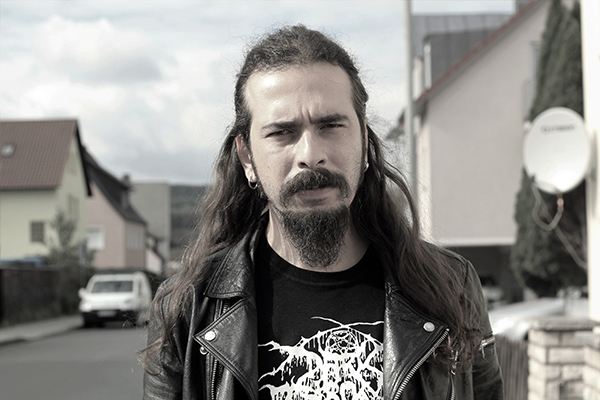 Jerneja: You are originally from Turkey but now residing in Australia. What (or who) brought you Down Under, and what are your experiences as a musician in Turkey and Australia?Oytun
Jerneja: You are originally from Turkey but now residing in Australia. What (or who) brought you Down Under, and what are your experiences as a musician in Turkey and Australia?Oytun: Actually, this was a decision I made with my family. We have had the idea to relocate for a long time. The reason why we chose Australia amongst a few other countries was isolation. Just imagine, it's a place away from everything, and it's so calm! Although we have not fully explored (due to the epidemic) the details of this island country, I can say that time is slowing down. This serenity and peace that I have experienced, especially after coming out of the chaos, which can be Istanbul, is frankly a tremendous thing.
Jerneja: Australia is known for several unique animal species, many - like the Irukandji jellyfish - no one would want to come across. How did you get used to all this "danger" being on the lookout in every corner? Have you had any unusual encounters that you are willing to share?Oytun: At least there are no people in every corner; maybe this is an advantage! I haven't had the opportunity to meet the animals you mentioned yet. It's a bit difficult to come across such extreme animals in cities anyway. But I have had a small moment of tension. It is possible to see the cockroach insect, which I often see in Turkey, in slightly larger sizes here. One day, whilst riding a bike, I came across flying cockroaches and frankly, it wasn't a very enjoyable moment... Of course, you can also be attacked by magpie birds during their spawning period, which is a normal part of life here!
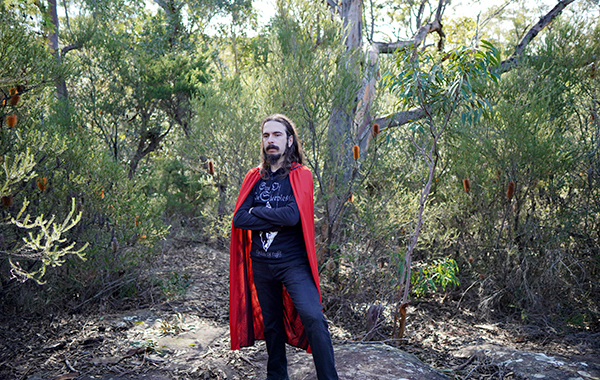 Jerneja: Returning to music, you submitted three songs for the Terra Relicta Sleep Of Morpheus Spell compilation (Ruins Of Xibalba - "Reverie", Tir - "The Song Of The Cosmos Is Heard From Persepolis" and Tir - "Majestic Emperor"). Assuming you've listened to the whole compilation, what is your opinion about it, and are there some songs besides yours you especially like?Oytun
Jerneja: Returning to music, you submitted three songs for the Terra Relicta Sleep Of Morpheus Spell compilation (Ruins Of Xibalba - "Reverie", Tir - "The Song Of The Cosmos Is Heard From Persepolis" and Tir - "Majestic Emperor"). Assuming you've listened to the whole compilation, what is your opinion about it, and are there some songs besides yours you especially like?Oytun: I have always found this type of work positive. I think it is especially important for the listener. All of the arts produced in these two compilations are no more valuable than the other. It is difficult to give the name of individual artists. Compilations with strong concepts and atmosphere work particularly well as a whole. I hope there is more to come.
Jerneja: Since we brought this interview to an end, would you like to communicate something to Terra Relicta web magazine readers?Oytun: As important as underground music is to me, all the more important are the magazines that support that music to me. You are a part of the rare group that does this with this stubbornness and dedication. So I would like to congratulate you again. Through you, I would like to tell
Tir and
Ruins Of Xibalba listeners that 2022 will be an important year. Stay tuned! Thanks.
Jerneja: Thank you again for this interview and your appreciation of our work. No doubt, we'll hear more of you/your music in the future.
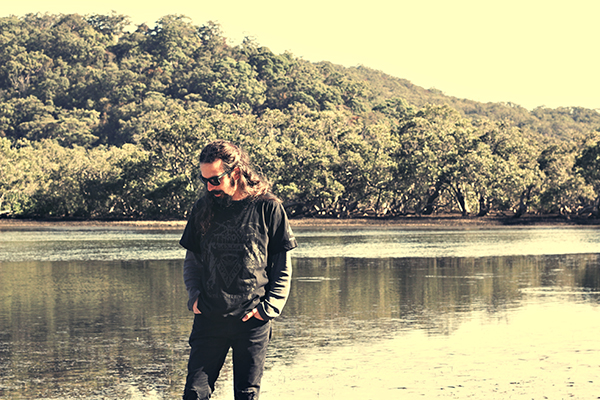
Tir links:
Facebook,
Instagram,
Twitter,
Bandcamp,
YouTube.
Tir discography:
Mountains (2016)
Urd, Skuld & Verdandi (2019)
Mountains Redux (2019)
The Vanished Civilization Of Xattoth (2019)
Nigritude [EP] (2020)
Persepolis (2021)
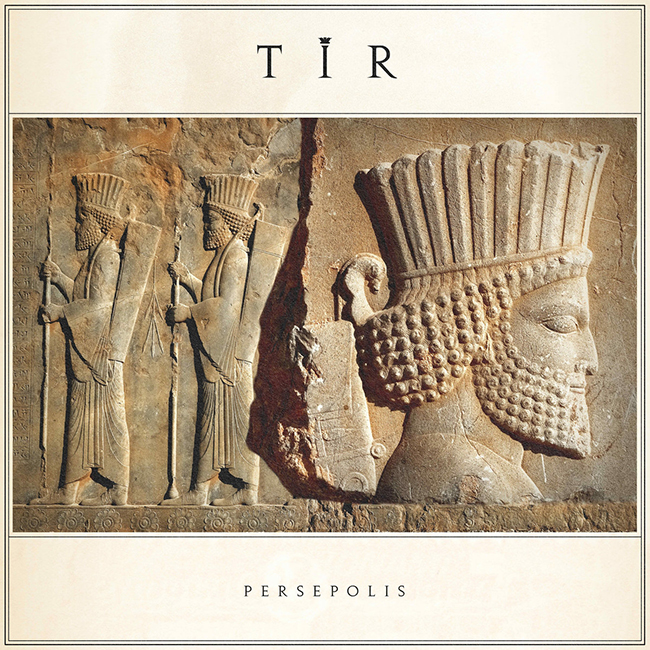


 Jerneja: Thank you, Oytun, for accepting my interview request. Maybe the predictable first question, but anyway, what Tir stands for?
Jerneja: Thank you, Oytun, for accepting my interview request. Maybe the predictable first question, but anyway, what Tir stands for? Jerneja: The Vanished Civilization Of Xattoth is not the only one Tir's album with a "second version". The first album, Mountains, also has one - the third album, Mountains Redux, released about three years later. How come? Since all of your albums were (quickly) sold out, it's hard to believe you wouldn't be satisfied with the "first version"?
Jerneja: The Vanished Civilization Of Xattoth is not the only one Tir's album with a "second version". The first album, Mountains, also has one - the third album, Mountains Redux, released about three years later. How come? Since all of your albums were (quickly) sold out, it's hard to believe you wouldn't be satisfied with the "first version"? Jerneja: There are only rare tracks where we can hear your voice (if it is your voice), and artificial voices are not very representative in your music either (if they are artificial voices)...
Jerneja: There are only rare tracks where we can hear your voice (if it is your voice), and artificial voices are not very representative in your music either (if they are artificial voices)... Jerneja: What does composing music mean to you, giving inspiration an "eternal life", healing yourself, or...?
Jerneja: What does composing music mean to you, giving inspiration an "eternal life", healing yourself, or...? Jerneja: You are originally from Turkey but now residing in Australia. What (or who) brought you Down Under, and what are your experiences as a musician in Turkey and Australia?
Jerneja: You are originally from Turkey but now residing in Australia. What (or who) brought you Down Under, and what are your experiences as a musician in Turkey and Australia? Jerneja: Returning to music, you submitted three songs for the Terra Relicta Sleep Of Morpheus Spell compilation (Ruins Of Xibalba - "Reverie", Tir - "The Song Of The Cosmos Is Heard From Persepolis" and Tir - "Majestic Emperor"). Assuming you've listened to the whole compilation, what is your opinion about it, and are there some songs besides yours you especially like?
Jerneja: Returning to music, you submitted three songs for the Terra Relicta Sleep Of Morpheus Spell compilation (Ruins Of Xibalba - "Reverie", Tir - "The Song Of The Cosmos Is Heard From Persepolis" and Tir - "Majestic Emperor"). Assuming you've listened to the whole compilation, what is your opinion about it, and are there some songs besides yours you especially like?
